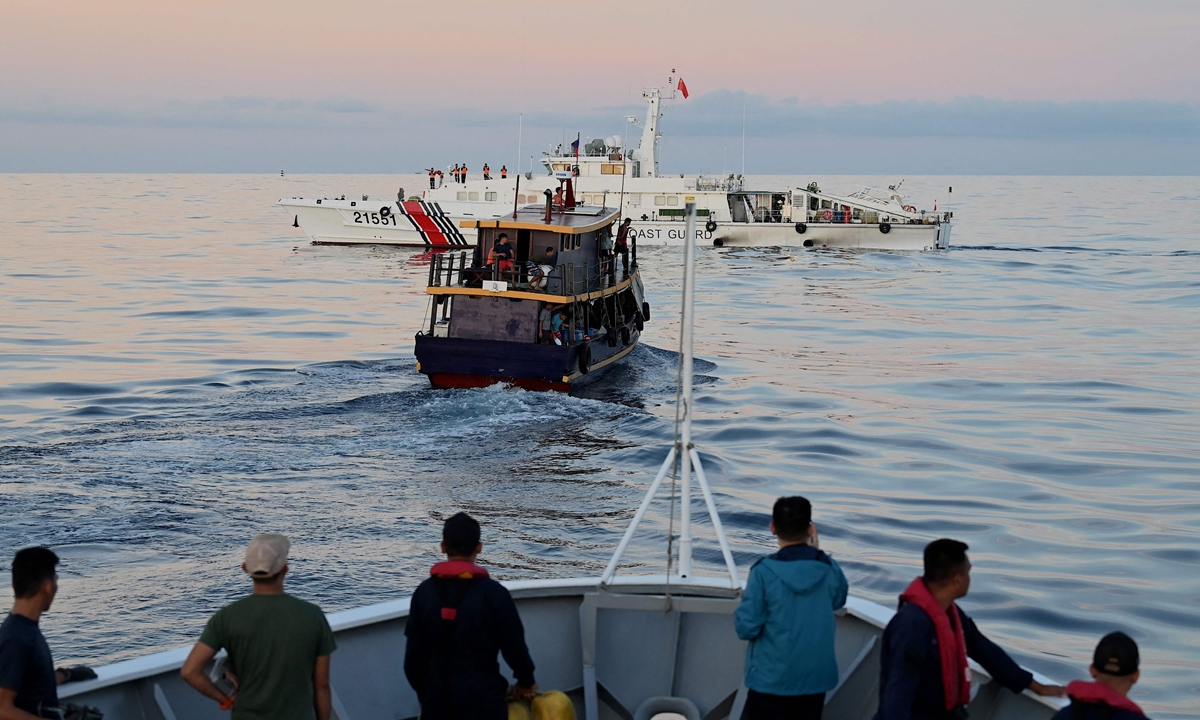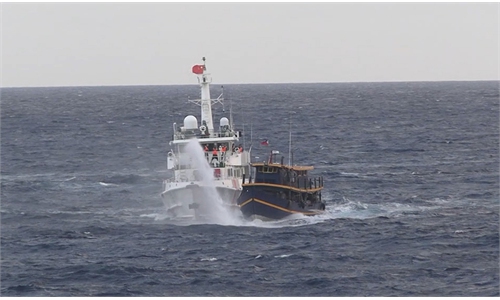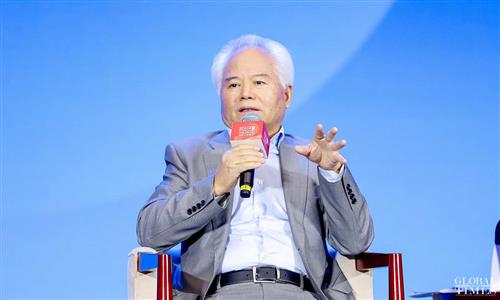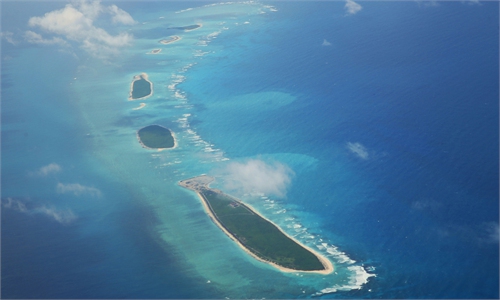
China urges some Philippines ships to immediately cease its infringing actions on November 10, 2023. Two small Philippine transport ships and three Philippine Coast Guard ships illegally entered the area on that day without China's permission. Photo: Visual News
Amid escalating tensions in the South China Sea, the Philippines persists in its provocative actions and maneuvers despite repeated warnings from China. Manila intends to forge a military agreement with Japan in early 2024, while simultaneously preparing a court action against China concerning alleged "destructive environmental activity" in the South China Sea. This legal action comes in the wake of the Philippine military chief's statement about developing islands in the South China Sea region to enhance their suitability for troops.
Some Chinese experts believe that the Marcos Jr. government's policy toward China has been constrained by multiple factors including domestic political struggles and the US' Indo-Pacific strategy. Although the possible court action may not have a substantial impact in practice, it could carry symbolic weight to increase international pressure on China regarding the South China Sea. And with support and encouragement from the US and Japan, the Philippines could continue provoking China through various means, experts warned.
Philippine prosecutors are preparing a case against China that will be filed before the Permanent Court of Arbitration (PCA) in The Hague, Netherlands, for destructive environmental activity in the South China Sea, the Manila Times reported on Tuesday.
Justice Secretary Jesus Crispin Remulla said the Philippine government had been gathering evidence for years, but the documentation only gained momentum "in the last few months" of 2023.
Also on Tuesday, Japanese media reported that the Philippines hopes to sign an agreement with Japan allowing the deployment of military forces on each other's territory in the first quarter of 2024. Meanwhile, the Philippines and Canada are also working on a memorandum of understanding for enhanced defense cooperation, the Japan Times reported.
Those moves came after Manila's military chief Romeo Brawner told reporters that The Philippines will develop islands in the South China Sea amid heightened tensions between the Philippines and China to make them more habitable for troops, toward which the Chinese Foreign Ministry voiced strong opposition on Tuesday, saying that "China has indisputable sovereignty over Nansha Qundao and the adjacent waters."
From the current actions taken by the Philippines regarding the South China Sea, it seems unlikely that the Marcos Jr. government's stance will change. The influence of the US plays a significant role, and the Marcos government faces considerable constraints, Ge Hongliang, deputy director of the College of ASEAN Studies at Guangxi University for Nationalities, told the Global Times on Wednesday.
Defense cooperation between Japan and the Philippines will further contribute to Japan's involvement in the South China Sea, including broader regional security aspects, Ge said. "This could potentially lead to heightened military competition among major powers in the South China Sea region, increasing security risks in the area as a whole."
The recent developments involving China and the Philippines in the South China Sea are caused by the Philippines' change in policy and position, refusing to honor its commitments, violations of international law and the Declaration on the Conduct of Parties in the South China Sea, and deliberate infringement of China's sovereignty and provocations, Chinese Foreign Ministry spokesperson Mao Ning said at a press conference on December 26, 2023. "The responsibility lies with the Philippines," she said.
Also, the Chinese Foreign Ministry has repeatedly warned that relevant countries should halt their irresponsible moves and respect regional countries' effort to uphold peace and stability in the South China Sea.
"Matters between the Philippines and China should ideally be resolved through bilateral discussions between the two parties, and external countries should avoid interference," Song Zhongping, a Chinese military expert and TV commentator, told the Global Times on Wednesday.
Involvement by extra-regional nations can complicate the situation further, especially when they insert themselves into issues between the Philippines and China, potentially pursuing their own interests through the Philippines, Song said.
"Such involvement can only lead to more trouble, given the already tense regional situation. If this continues, it could escalate tensions further," he said.
With the support and encouragement of the US and Japan, the Philippines might continue provoking China through various means, experts warned. This could include legal means, such as highlighting the invalid South China Sea arbitration case, initiating new legal arbitrations, or establishing a South China Sea patrol mechanism with multiple countries.
"Also, vowing to undertake infrastructure projects on disputed features like China's Ren'ai Jiao, which are provocative actions, the Philippines may expand its military capabilities despite financial constraints," Song said.




